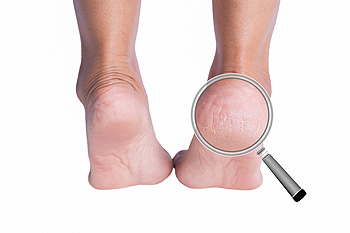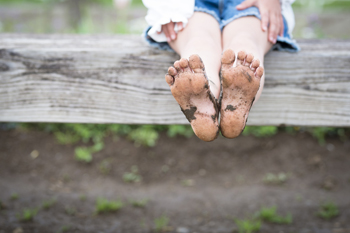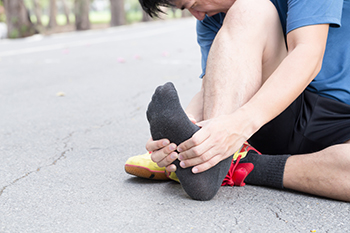Items filtered by date: November 2022
Mitigating Foot Pain During Pregnancy

During a woman’s pregnancy, she might experience several different important changes to her feet. For example, the increased weight gained from bearing a growing child can put extra strain on the feet, sometimes causing foot pain. There are several steps that a pregnant woman could consider taking to mitigate her increased foot pain. First, a pregnant woman might drink a good deal of water. Doing this will help reduce the amount of salt in the body, consequently minimizing inflammation in the feet. Also, a pregnant woman could apply ice to the feet if the ankles become exceedingly swollen. Applying ice in short increments to the feet can help bring down the swelling. Lastly, a pregnant woman can make an appointment with a podiatrist to help treat any pain in the feet that she is experiencing. To learn more about mitigating foot pain during pregnancy, make an appointment with a podiatrist today.
Pregnant women with swollen feet can be treated with a variety of different methods that are readily available. For more information about other cures for swollen feet during pregnancy, consult with Dr. Jim Maxka from South Penn Foot & Ankle Associates. Our doctor will attend to all of your foot and ankle needs.
What Foot Problems Can Arise During Pregnancy?
One problem that can occur is overpronation, which occurs when the arch of the foot flattens and tends to roll inward. This can cause pain and discomfort in your heels while you’re walking or even just standing up, trying to support your baby.
Another problem is edema, or swelling in the extremities. This often affects the feet during pregnancy but tends to occur in the later stages.
How Can I Keep My Feet Healthy During Pregnancy?
- Wearing orthotics can provide extra support for the feet and help distribute weight evenly
- Minimize the amount of time spent walking barefoot
- Wear shoes with good arch support
- Wear shoes that allow for good circulation to the feet
- Elevate feet if you experience swelling
- Massage your feet
- Get regular, light exercise, such as walking, to promote blood circulation to the feet
If you have any questions please feel free to contact our office located in Hanover, PA . We offer the newest diagnostic and treatment technologies for all your foot and ankle needs.
Mitigating Foot Pain During Pregnancy

During a woman’s pregnancy, she might experience several different important changes to her feet. For example, the increased weight gained from bearing a growing child can put extra strain on the feet, sometimes causing foot pain. There are several steps that a pregnant woman could consider taking to mitigate her increased foot pain. First, a pregnant woman might drink a good deal of water. Doing this will help reduce the amount of salt in the body, consequently minimizing inflammation in the feet. Also, a pregnant woman could apply ice to the feet if the ankles become exceedingly swollen. Applying ice in short increments to the feet can help bring down the swelling. Lastly, a pregnant woman can make an appointment with a podiatrist to help treat any pain in the feet that she is experiencing. To learn more about mitigating foot pain during pregnancy, make an appointment with a podiatrist today.
Pregnant women with swollen feet can be treated with a variety of different methods that are readily available. For more information about other cures for swollen feet during pregnancy, consult with Jim Maxka, DPM from South Penn Foot & Ankle Associates. Our doctor will attend to all of your foot and ankle needs.
What Foot Problems Can Arise During Pregnancy?
One problem that can occur is overpronation, which occurs when the arch of the foot flattens and tends to roll inward. This can cause pain and discomfort in your heels while you’re walking or even just standing up, trying to support your baby.
Another problem is edema, or swelling in the extremities. This often affects the feet during pregnancy but tends to occur in the later stages.
How Can I Keep My Feet Healthy During Pregnancy?
- Wearing orthotics can provide extra support for the feet and help distribute weight evenly
- Minimize the amount of time spent walking barefoot
- Wear shoes with good arch support
- Wear shoes that allow for good circulation to the feet
- Elevate feet if you experience swelling
- Massage your feet
- Get regular, light exercise, such as walking, to promote blood circulation to the feet
If you have any questions please feel free to contact our office located in Hanover, PA . We offer the newest diagnostic and treatment technologies for all your foot and ankle needs.
Several Causes for Cracked Heels

Cracked heels are unsightly and can become painful. This foot condition can develop for a variety of reasons and may bring embarrassment to the affected patient. The causes can include wearing shoes with an open back, standing on hard surfaces for most of the day, and a lack of moisture. Additionally, research has indicated that cracked heels may develop from specific vitamin or mineral deficiencies as well as aging skin. There may also be medical conditions that lead to cracked heels, which consist of obesity, thyroid disorders, eczema, and psoriasis. Many patients find relief when their feet are soaked in warm water, followed by applying a good moisturizer. Choosing shoes that have a closed back may help to prevent cracked heels in addition to wearing shoes that generally fit well. Patients who have dry heels or show signs of fissures, also known as deep cracks, are urged to speak with a podiatrist who can prescribe medication to treat this ailment.
If the skin on your feet starts to crack, you may want to see a podiatrist to find treatment. If you have any concerns, contact Dr. Jim Maxka from South Penn Foot & Ankle Associates. Our doctor can provide the care you need to keep you pain-free and on your feet.
Cracked Heels
It is important to moisturize your cracked heels in order to prevent pain, bleeding, and infection. The reason cracked heels form is because the skin on the foot is too dry to support the immense pressure placed on them. When the foot expands, the dry skin on the foot begins to split.
Ways to Help Heal Them
- Invest in a good foot cream
- Try Using Petroleum Jelly
- Ease up on Soaps
- Drink Plenty of Water
Ways to Prevent Cracked Heels
- Moisturize After Showering
- Skip a Shower
- Keep Shower Water Lukewarm
- Don’t Scrub Your Feet
If you are unsure how to proceed in treating cracked heels, seek guidance from a podiatrist. Your doctor will help you with any questions or information you may need.
If you have any questions, please feel free to contact our office located in Hanover, PA . We offer the newest diagnostic and treatment technologies for all your foot care needs.
Several Causes for Cracked Heels

Cracked heels are unsightly and can become painful. This foot condition can develop for a variety of reasons and may bring embarrassment to the affected patient. The causes can include wearing shoes with an open back, standing on hard surfaces for most of the day, and a lack of moisture. Additionally, research has indicated that cracked heels may develop from specific vitamin or mineral deficiencies as well as aging skin. There may also be medical conditions that lead to cracked heels, which consist of obesity, thyroid disorders, eczema, and psoriasis. Many patients find relief when their feet are soaked in warm water, followed by applying a good moisturizer. Choosing shoes that have a closed back may help to prevent cracked heels in addition to wearing shoes that generally fit well. Patients who have dry heels or show signs of fissures, also known as deep cracks, are urged to speak with a podiatrist who can prescribe medication to treat this ailment.
If the skin on your feet starts to crack, you may want to see a podiatrist to find treatment. If you have any concerns, contact Jim Maxka, DPM from South Penn Foot & Ankle Associates. Our doctor can provide the care you need to keep you pain-free and on your feet.
Cracked Heels
It is important to moisturize your cracked heels in order to prevent pain, bleeding, and infection. The reason cracked heels form is because the skin on the foot is too dry to support the immense pressure placed on them. When the foot expands, the dry skin on the foot begins to split.
Ways to Help Heal Them
- Invest in a good foot cream
- Try Using Petroleum Jelly
- Ease up on Soaps
- Drink Plenty of Water
Ways to Prevent Cracked Heels
- Moisturize After Showering
- Skip a Shower
- Keep Shower Water Lukewarm
- Don’t Scrub Your Feet
If you are unsure how to proceed in treating cracked heels, seek guidance from a podiatrist. Your doctor will help you with any questions or information you may need.
If you have any questions, please feel free to contact our office located in Hanover, PA . We offer the newest diagnostic and treatment technologies for all your foot care needs.
Kohler Disease and Its Impact on Children

Kohler disease is a rare bone disorder that causes a child’s foot to hurt and swell. This disease usually impacts children between the ages of 3 to 7. Boys are much more likely to be afflicted with Kohler disease than girls. The flow of blood to the navicular bone in the foot is interrupted and there is a progressive degeneration of the bone. Some experts believe it may be related to an injury near the navicular bone and delayed bone formation leading to structural weakness. It can be caused by genetic factors, or it may develop from stress-related compression during a child’s growth period. A child will often limp or walk on the side of their foot because it might hurt them to put weight on it. There may be tenderness along the length of the arch and the affected area may redden. Those with this disorder most often outgrow it and the affected bone regains size, density, and structure. It often resolves itself within three months to two years. Since other disorders can have symptoms similar to those of Kohler disease, treatment can be helpful. If your child is complaining of foot pain or you notice a gait change, contact a podiatrist who can diagnose the problem and offer remedies.
Some foot conditions may require additional professional care. If you have any concerns, contact Dr. Jim Maxka of South Penn Foot & Ankle Associates. Our doctor can provide the care you need to keep you pain-free and on your feet.
Rare Foot Conditions
The majority of foot conditions are common and can be treated by a podiatrist. Standard diagnostic procedures are generally used to identify specific conditions and treatment can be rendered. A podiatrist also treats rare foot conditions which can be difficult to diagnose and may need extra attention and care.
There are many rare foot conditions that can affect children. Some of these can include:
- Freiberg’s disease
- Kohler’s disease
- Maffucci syndrome
Freiberg’s disease - This can be seen as a deterioration and flattening of a metatarsal bone that exists in the ball of the foot. It typically affects pre-teen and teenage girls, but can affect anyone at any age. Symptoms that can accompany this can be swelling, stiffness, and the patient may limp.
Kohler’s disease - This often targets the bone in the arch of the foot and affects younger boys. It can lead to an interruption of the blood supply which ultimately can lead to bone deterioration. The patient may limp or experience tenderness, swelling, and redness.
Maffucci syndrome - This affects the long bones in a child’s foot leading to the development of abnormal bone lesions. They are benign growths and typically develop in early childhood and the bones may be susceptible to breaking.
A podiatrist can properly diagnose and treat all types of rare foot conditions. If your child is affected by any of these symptoms or conditions, please don’t hesitate to call our office so the correct treatment method can begin.
If you have any questions please feel free to contact our office located in Hanover, PA . We offer the newest diagnostic tools and technology to treat your foot and ankle needs.
Kohler Disease and Its Impact on Children

Kohler disease is a rare bone disorder that causes a child’s foot to hurt and swell. This disease usually impacts children between the ages of 3 to 7. Boys are much more likely to be afflicted with Kohler disease than girls. The flow of blood to the navicular bone in the foot is interrupted and there is a progressive degeneration of the bone. Some experts believe it may be related to an injury near the navicular bone and delayed bone formation leading to structural weakness. It can be caused by genetic factors, or it may develop from stress-related compression during a child’s growth period. A child will often limp or walk on the side of their foot because it might hurt them to put weight on it. There may be tenderness along the length of the arch and the affected area may redden. Those with this disorder most often outgrow it and the affected bone regains size, density, and structure. It often resolves itself within three months to two years. Since other disorders can have symptoms similar to those of Kohler disease, treatment can be helpful. If your child is complaining of foot pain or you notice a gait change, contact a podiatrist who can diagnose the problem and offer remedies.
Some foot conditions may require additional professional care. If you have any concerns, contact Jim Maxka, DPM of South Penn Foot & Ankle Associates. Our doctor can provide the care you need to keep you pain-free and on your feet.
Rare Foot Conditions
The majority of foot conditions are common and can be treated by a podiatrist. Standard diagnostic procedures are generally used to identify specific conditions and treatment can be rendered. A podiatrist also treats rare foot conditions which can be difficult to diagnose and may need extra attention and care.
There are many rare foot conditions that can affect children. Some of these can include:
- Freiberg’s disease
- Kohler’s disease
- Maffucci syndrome
Freiberg’s disease - This can be seen as a deterioration and flattening of a metatarsal bone that exists in the ball of the foot. It typically affects pre-teen and teenage girls, but can affect anyone at any age. Symptoms that can accompany this can be swelling, stiffness, and the patient may limp.
Kohler’s disease - This often targets the bone in the arch of the foot and affects younger boys. It can lead to an interruption of the blood supply which ultimately can lead to bone deterioration. The patient may limp or experience tenderness, swelling, and redness.
Maffucci syndrome - This affects the long bones in a child’s foot leading to the development of abnormal bone lesions. They are benign growths and typically develop in early childhood and the bones may be susceptible to breaking.
A podiatrist can properly diagnose and treat all types of rare foot conditions. If your child is affected by any of these symptoms or conditions, please don’t hesitate to call our office so the correct treatment method can begin.
If you have any questions please feel free to contact our office located in Hanover, PA . We offer the newest diagnostic tools and technology to treat your foot and ankle needs.
Arthritis Can Cause Pain in the Feet and Ankles
Arthritis Can Cause Pain in the Feet and Ankles
Pediatric Plantar Fasciitis

Plantar fasciitis is a common reason for heel pain. This condition results from inflammation of the plantar fascia, the tendon connecting the heel to the toes. People of all ages can suffer from plantar fasciitis. It is developed over time and several factors can play into the cause of it. When children have this ailment, it is often associated with overuse. Repeated stress from being active in sports, being on their feet a lot, and not properly stretching before and after workouts might lead to plantar fasciitis. Anatomical deformities, like high arches or an inverted position of bones in the heel, can predispose active kids to develop this condition. It is generally associated with a painful inflammation of the heel’s growth plate, known as calcaneal apophysitis. Ill-fitting, poorly cushioned footwear that does not provide adequate arch support can be another reason a child might develop plantar fasciitis. Typical symptoms are heel pain, particularly upon arising, that improves with walking, and tenderness near the arch of the foot. Since untreated plantar fasciitis can lead to complications, such as heel spurs or a rupture of the plantar fascia, it is suggested that if your child complains of heel or foot pain, you consult with a podiatrist who can make a proper diagnosis and offer a treatment plan.
Plantar fasciitis is a common foot condition that is often caused by a strain injury. If you are experiencing heel pain or symptoms of plantar fasciitis, contact Dr. Jim Maxka from South Penn Foot & Ankle Associates. Our doctor can provide the care you need to keep you pain-free and on your feet.
What Is Plantar Fasciitis?
Plantar fasciitis is one of the most common causes of heel pain. The plantar fascia is a ligament that connects your heel to the front of your foot. When this ligament becomes inflamed, plantar fasciitis is the result. If you have plantar fasciitis you will have a stabbing pain that usually occurs with your first steps in the morning. As the day progresses and you walk around more, this pain will start to disappear, but it will return after long periods of standing or sitting.
What Causes Plantar Fasciitis?
- Excessive running
- Having high arches in your feet
- Other foot issues such as flat feet
- Pregnancy (due to the sudden weight gain)
- Being on your feet very often
There are some risk factors that may make you more likely to develop plantar fasciitis compared to others. The condition most commonly affects adults between the ages of 40 and 60. It also tends to affect people who are obese because the extra pounds result in extra stress being placed on the plantar fascia.
Prevention
- Take good care of your feet – Wear shoes that have good arch support and heel cushioning.
- Maintain a healthy weight
- If you are a runner, alternate running with other sports that won’t cause heel pain
There are a variety of treatment options available for plantar fasciitis along with the pain that accompanies it. Additionally, physical therapy is a very important component in the treatment process. It is important that you meet with your podiatrist to determine which treatment option is best for you.
If you have any questions, please feel free to contact our office located in Hanover, PA . We offer the newest diagnostic and treatment technologies for all your foot care needs.
Pediatric Plantar Fasciitis

Plantar fasciitis is a common reason for heel pain. This condition results from inflammation of the plantar fascia, the tendon connecting the heel to the toes. People of all ages can suffer from plantar fasciitis. It is developed over time and several factors can play into the cause of it. When children have this ailment, it is often associated with overuse. Repeated stress from being active in sports, being on their feet a lot, and not properly stretching before and after workouts might lead to plantar fasciitis. Anatomical deformities, like high arches or an inverted position of bones in the heel, can predispose active kids to develop this condition. It is generally associated with a painful inflammation of the heel’s growth plate, known as calcaneal apophysitis. Ill-fitting, poorly cushioned footwear that does not provide adequate arch support can be another reason a child might develop plantar fasciitis. Typical symptoms are heel pain, particularly upon arising, that improves with walking, and tenderness near the arch of the foot. Since untreated plantar fasciitis can lead to complications, such as heel spurs or a rupture of the plantar fascia, it is suggested that if your child complains of heel or foot pain, you consult with a podiatrist who can make a proper diagnosis and offer a treatment plan.
Plantar fasciitis is a common foot condition that is often caused by a strain injury. If you are experiencing heel pain or symptoms of plantar fasciitis, contact Jim Maxka, DPM from South Penn Foot & Ankle Associates. Our doctor can provide the care you need to keep you pain-free and on your feet.
What Is Plantar Fasciitis?
Plantar fasciitis is one of the most common causes of heel pain. The plantar fascia is a ligament that connects your heel to the front of your foot. When this ligament becomes inflamed, plantar fasciitis is the result. If you have plantar fasciitis you will have a stabbing pain that usually occurs with your first steps in the morning. As the day progresses and you walk around more, this pain will start to disappear, but it will return after long periods of standing or sitting.
What Causes Plantar Fasciitis?
- Excessive running
- Having high arches in your feet
- Other foot issues such as flat feet
- Pregnancy (due to the sudden weight gain)
- Being on your feet very often
There are some risk factors that may make you more likely to develop plantar fasciitis compared to others. The condition most commonly affects adults between the ages of 40 and 60. It also tends to affect people who are obese because the extra pounds result in extra stress being placed on the plantar fascia.
Prevention
- Take good care of your feet – Wear shoes that have good arch support and heel cushioning.
- Maintain a healthy weight
- If you are a runner, alternate running with other sports that won’t cause heel pain
There are a variety of treatment options available for plantar fasciitis along with the pain that accompanies it. Additionally, physical therapy is a very important component in the treatment process. It is important that you meet with your podiatrist to determine which treatment option is best for you.
If you have any questions, please feel free to contact our office located in Hanover, PA . We offer the newest diagnostic and treatment technologies for all your foot care needs.

 Like Us
Like Us Follow Us
Follow Us Review Us
Review Us